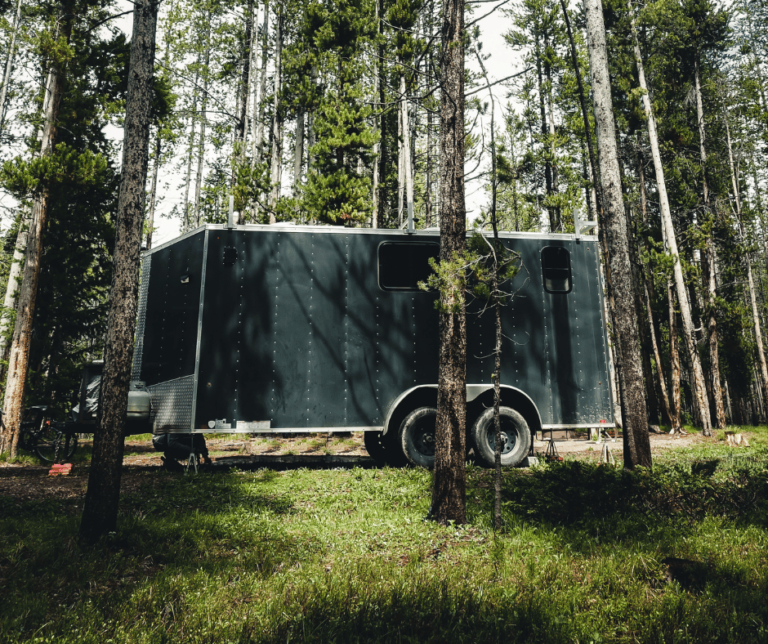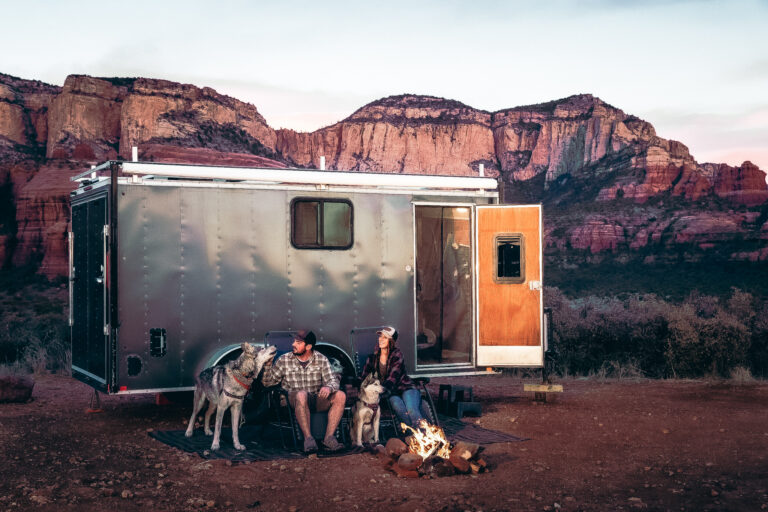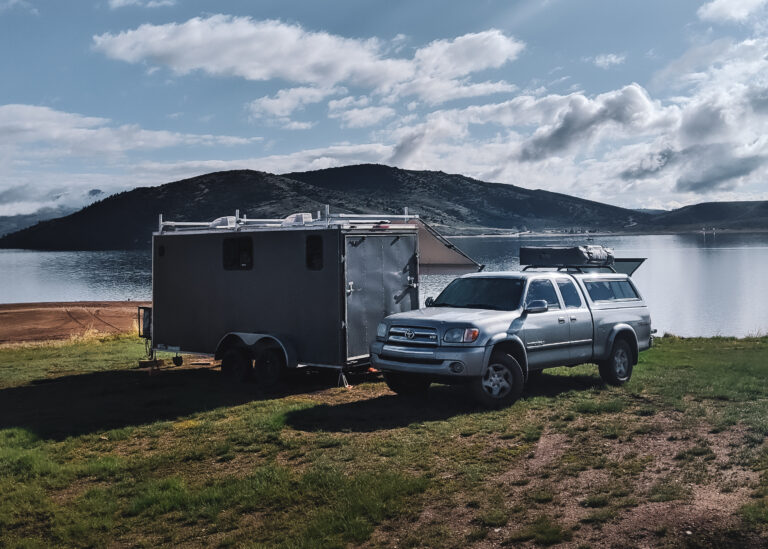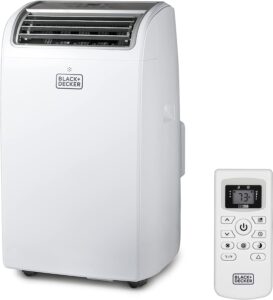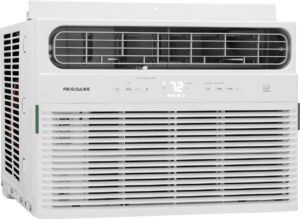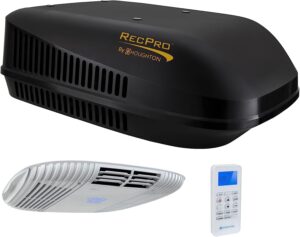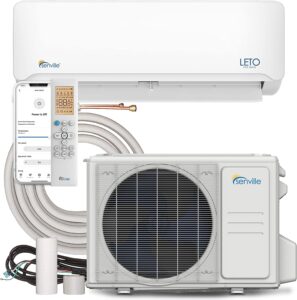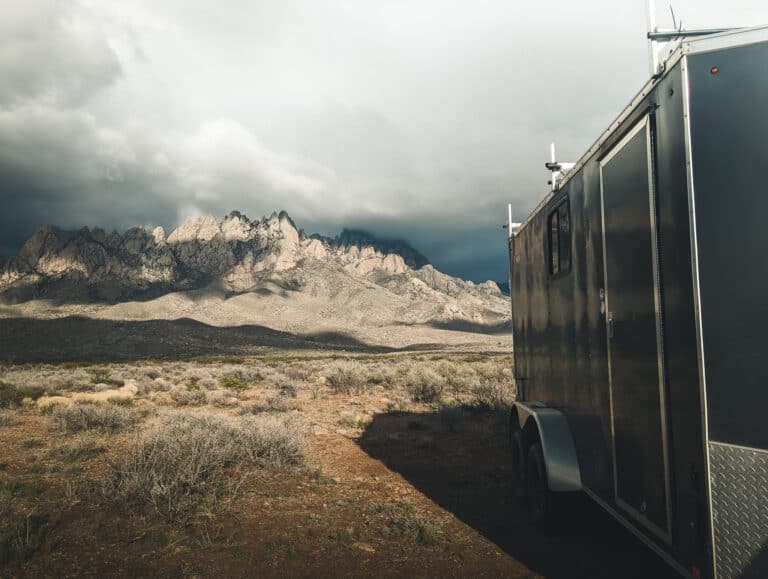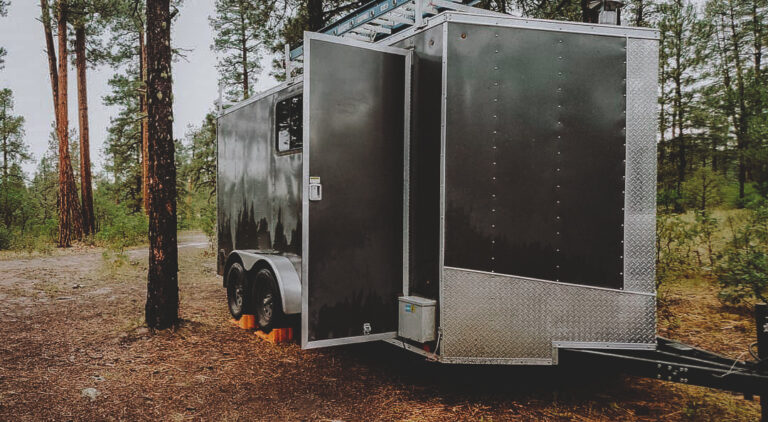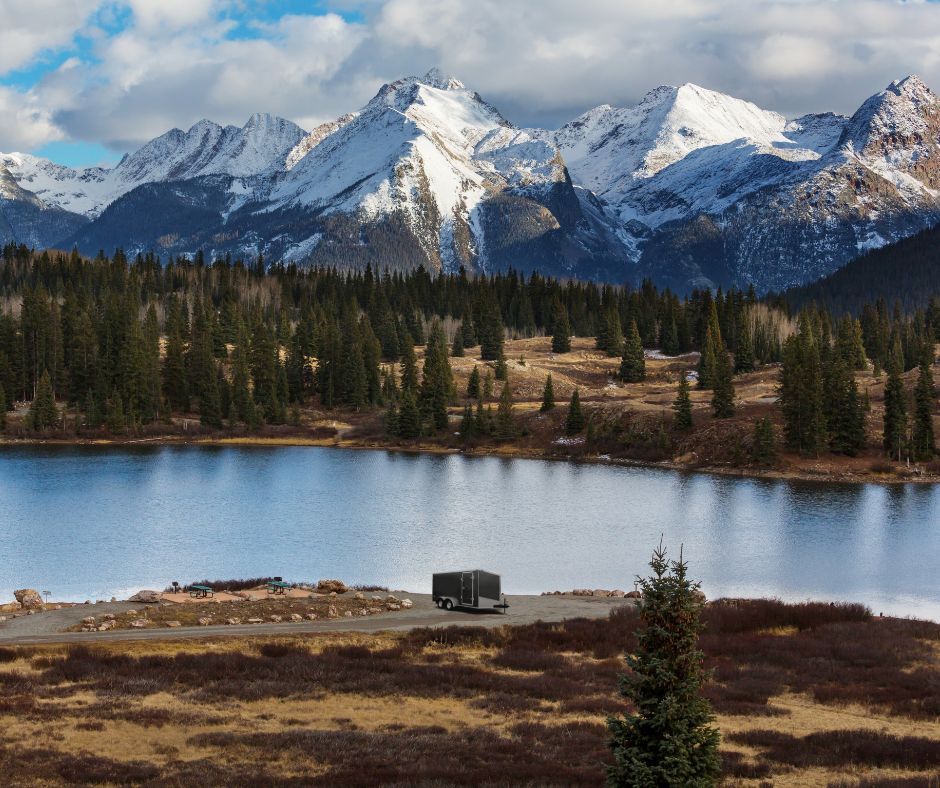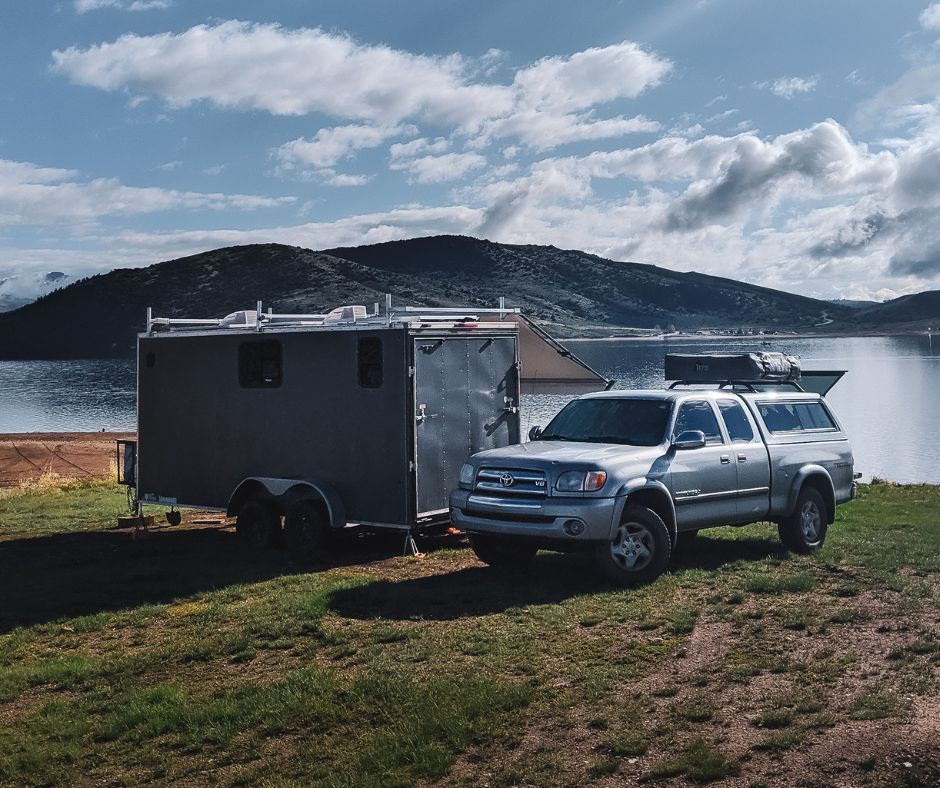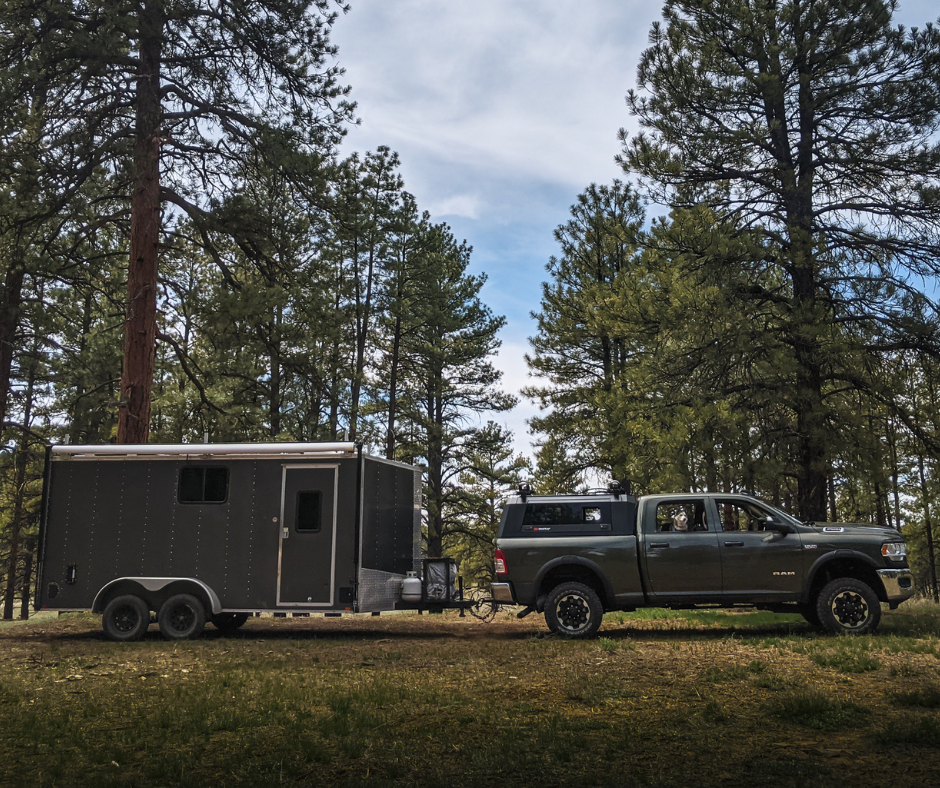Best A/C Units to Keep Your Cargo Trailer Conversion Cool
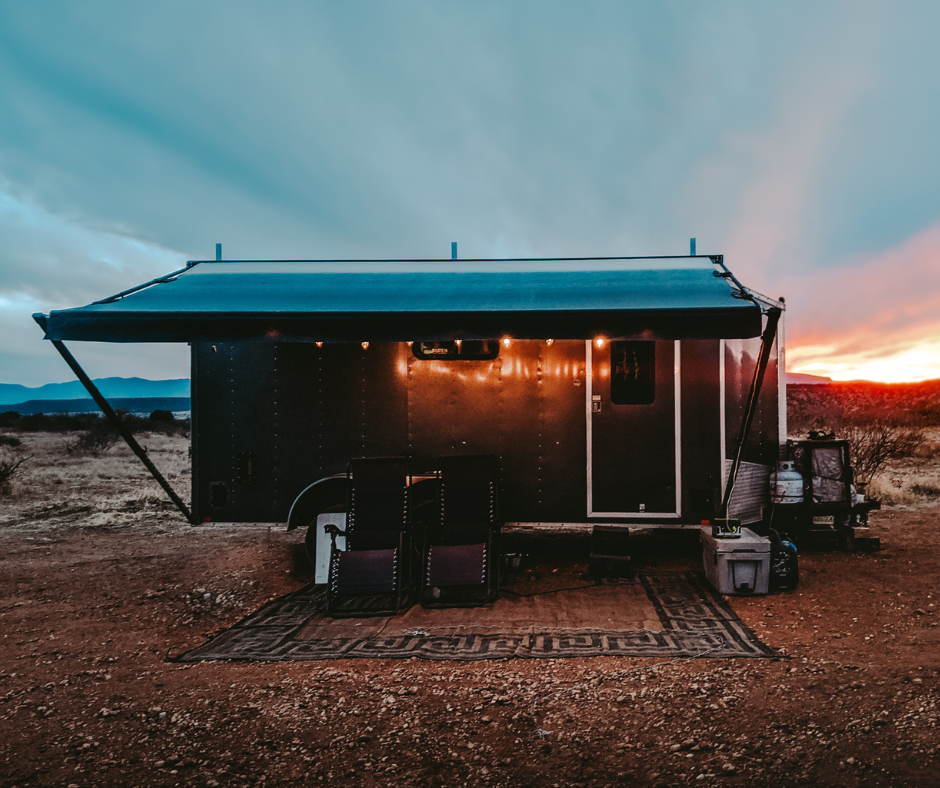
In 2017, I bought a 7×16 cargo trailer, threw a mattress on the floor, and called it home. Despite my family’s doubts, all I saw was an affordable and stealthy home on wheels that would allow me to live comfortably and inconspicuously in urban areas.
During the day, I worked as a window washer, and at night, I would sleep in the trailer without raising any suspicions. Thanks to my blackout curtains, nobody knew I was inside.
However, there was one crucial aspect that I had failed to consider—the unbearable heat that built up inside the trailer during the summer. The metal panels on the exterior basically made the cargo trailer an oven on wheels, and I needed a solution to cool it down.
As cargo trailer campers continue to gain momentum, I wanted to share my own experience and lessons learned to help others avoid the pitfalls I encountered along the way (especially the discomfort I endured while living in a scorching hot cargo trailer).
In this blog post, we will compare the best air conditioning units for enclosed trailers, examining the pros and cons of different options, including rooftop AC units, mini-split systems, portable air conditioners, and window AC units. I’ll also share details about the unit we picked and why.
Affiliate Disclaimer: Affiliate links may be sprinkled throughout this awesome, helpful, and completely free content. I’ll receive a small commission when you purchase from my links (at no extra cost to you), which I’ll absolutely blow on adult things like hiking gear and dog toys.
Table of Contents
ToggleChoosing the Right AC Unit for A Cargo Trailer
I want to be straightforward with you. No matter how well-insulated your trailer may be, its metal panels can still scorch your skin on a hot summer day. The heat easily transfers through the walls, making the interior unbearably hot unless you have a reliable AC unit continuously cooling it.
When selecting an air conditioner for your cargo trailer conversion, there are several important factors to consider. These factors will help you choose an AC unit that suits your specific needs and ensures a comfortable living space on the road.
Consider the Cost
When I initially built my trailer, I didn’t opt for an AC unit due to its high cost. This was back in 2017 when I was earning just $700 per week from working two minimum-wage jobs. AC units were priced between $600 and $1200, which I couldn’t afford at the time. However, in hindsight, enduring 100+ degree summers without AC was truly unpleasant.
Considering the cost is one of the crucial factors when choosing an AC unit for your mobile living space. You want to strike a balance between affordability and efficiency, taking into account both the upfront price and the ongoing operational expenses.
Size and Cooling Capacity
During my first summer, I somehow managed to gather enough money to purchase a portable A/C unit that rolled around on the ground.
It had a capacity of 9000 BTUs, and I was incredibly excited to finally find some relief. However, to my disappointment, I realized that the A/C unit was woefully undersized for my trailer. It barely made a difference in cooling it down. To make matters worse, I couldn’t return it, and I had just spent all my money on it.
When considering the BTU rating (British Thermal Units) of an AC unit, know that the higher the BTUs, the more square feet it can cover.
However, for a trailer, you need to double the BTU rating because manufacturers typically assume the unit will be installed in a house with 4-6 inches of insulation, whereas trailers usually have 1-2 inches. As a result, heat transfer is significantly greater in a trailer compared to a house.
You need to consider the size of your living area and the weather conditions you’ll face. If the air conditioner is too small, it might not cool the space effectively.
Installation Options and Space Limitations
After selling the portable AC unit and saving up more money, I decided to go all out. I installed a 12000 BTU mini-split AC unit from Senville at the front of my trailer.
This new AC unit worked flawlessly, and for the first time, I could enjoy being inside my cargo trailer without constantly sweating. However, there was one issue—I had placed the AC unit in the front, which was the farthest spot from where I spent most of my time in the trailer.
The lesson I learned is to install your AC unit in the center of your trailer or as close as possible to the area where you spend most of your time. In my case, I primarily stayed in the back of the trailer, where my work desk and bed were located. Since the AC unit was at the front, the cold air had difficulty reaching me without the help of an additional fan.
How to Cool Down a Cargo Trailer
There are four main types of AC options to cool down a cargo trailer including Rooftop, Minisplit, Portable A/C and Window A/C units. Let’s explore their positives and negatives.
1. Portable Air Conditioners
Portable AC units are the cheapest option, but they have many downsides. They are extremely loud and consume a lot of power without efficiently cooling the space. The only advantage is their portability. I don’t recommend them.
However, if for whatever reason, this is the best option for you, I suggest opting for a 12,000-14,000 BTU system, considering the inefficiency of these units. These systems typically require a power consumption of 900 to 1500 watts. To ensure the long-term operation of this unit, you will need a generator capable of providing a continuous power output of at least 3000 watts. It’s important to note that these A/C units can generate significant noise comparable to the noise level of an RV generator. This noise can be quite annoying, especially considering that you’ll be in close proximity to the unit while it’s running.
Pros: As the name suggests, portable AC units are designed to be easily movable. You can conveniently move them around your trailer, meaning you won’t have to make permanent modifications to your space. They are also generally more affordable than other options.
Cons: Portable air conditioners take up floor space and require a vent to exhaust hot air outside the trailer. They may be less energy-efficient compared to other options. Noise levels can vary, and they may require periodic emptying of the condensate tray.
Best Portable Air Conditioner for a Cargo Trailer
BLACK+DECKER Portable Air Conditioner, 14,000 BTU –$479.99
This portable air conditioner offers a cooling capacity of 14,000 BTUs, making it suitable for rooms (in a house) up to 700 square feet in size. It features a double motor dehumidifier and comes with a remote control for easy operation and adjustment of settings.
BLACK+DECKER portable Air Conditioner 14,000 BTU is going to cost you around $479 and will require at a minimum a generator that will put out 3000 watts of continuous power.
2. Window A/C Units
Window units are relatively cheaper than other options. However, they require cutting a hole in the trailer’s side, which I wanted to avoid. The other option is to fit them in a window, but it has to be the right size.
These units can cool a small space effectively and require around 500 watts to start and 350 watts to run continuously. Make sure to research the wattage requirements based on the BTU size you get.
Pros: Window AC units are cost-effective and widely available. They are easy to install in a window opening requiring minimal modifications. Many window A/C units come with remote control or digital panels, allowing for easy adjustment of temperature and fan settings. They are typically more affordable compared to other options.
Cons: Window AC units require a suitable window or opening for installation, which may limit placement options. They can obstruct natural light and affect visibility through the window. They may also be less efficient and noisier compared to other options. Last, from the outside of your trailer, a window A/C unit can be less aesthetically pleasing compared to the other options on the list.
Best Window A/C Unit For a Cargo Trailer
Frigidaire FHWC124WB1 Window Air Conditioner—$439
With remote temperature control, you can customize the temperature and fan speeds to your liking. Boasting a cooling capacity of 12,000 BTUs and a 12.0 CEER, this air conditioner has the power to cool approximately 500 sq. ft with a window mounting kit.
For a Frigidaire FHWC124WB1 Window Air Conditioner, 12,000 BTU, on Amazon it’s going to cost you $439 and expect that unit to take around 500 watts of electricity to run. Using a 2000-watt portable generator will work fine for these types of units.
3. Ductless Rooftop RV A/C Units
Ductless rooftop AC units take up little space and are designed to provide efficient and targeted cooling. Unlike traditional central air conditioning systems, which rely on a network of ducts to distribute cool air throughout a building, ductless rooftop AC units operate independently without the need for ductwork.
These units consist of two main components: an outdoor compressor unit installed on the roof and one or more indoor air handlers mounted on the walls or ceilings inside the building. The outdoor unit is responsible for compressing and cooling the refrigerant, while the indoor units blow the conditioned air into the trailer.
However, they are very loud. They also consume a significant amount of power, especially when starting, so you need a generator with sufficient wattage to handle them.
Pros: Rooftop AC units are compact, efficient, and provide cooling for the entire trailer. They are self-contained and don’t take up valuable interior space. They are also relatively easy to install on the roof of the trailer.
Cons: Rooftop AC units can be more expensive upfront compared to other options. They may also require professional installation and maintenance. These units also require a substantial amount of power to run, which can be a concern if you have limited power sources or rely on a generator. Additionally, they add height and weight to the trailer, which could impact clearance and towing capacity.
Best Ductless A/C unit for Cargo Trailer Conversion
The RecPro RV Air Conditioner 13500 BTU—$999
The RecPro RV Air Conditioner 13500 BTU is a quiet and efficient all-in-one unit designed for easy installation in cargo trailers. It operates on 110-120V power and does not require ducting, making it a convenient option for trailer setups. With a cooling capacity of 13,500 BTU, it provides sufficient cooling for a comfortable interior environment. The unit is designed to be durable and reliable, with a focus on reducing compressor noise.
RecPro RV Air Conditioner 13500 BTU is going to cost you $999 and will require, at a minimum, a generator that will put out 3000 watts of continuous power.
4. Mini Split A/C Units
Mini Splits are whisper-quiet and provide the coldest air per BTU rating, in my opinion. They are also highly energy efficient and often include a heating function. However, installing them can be complicated and require special tools or professional installation. The inside unit does take up wall space, but the quiet operation outweighs this inconvenience.
Pros: Mini-split systems are known for their quiet operation, with the noisiest components located outside the trailer. Mini split systems are highly energy-efficient, offering precise temperature control and under 700 watts on average once the unit is running. Mini split systems provide both cooling and heating capabilities, making them suitable for year-round use. They can efficiently cool the trailer in hot weather and provide warmth during colder seasons.
Cons: Mini-split systems require more complex installation, including drilling holes for refrigerant lines and electrical wiring. They may also be costlier compared to other options. Additionally, they require periodic maintenance and cleaning. This may involve cleaning filters, checking refrigerant levels, and inspecting the components.
Best Mini Split A/C for Cargo Trailer Conversions
Senville LETO Series Mini Split Air Conditioner—$779
This compact unit delivers powerful cooling and heating with its 12000 BTU capacity and 110/120V power requirement.
I personally recommend considering the Senville LETO Series Mini Split Air Conditioner, which typically costs around $779. It requires 1500 watts to start up and then operates at around 800 watts. If you plan on running this unit for extended periods, I strongly suggest using a 3000 watt generator.
In the beginning, I made the mistake of using a 2000 watt generator, and although it managed to run the A/C unit, it wasn’t ideal. Unfortunately, after just 6 months, the generator ended up breaking due to the strain. Investing in a more powerful generator will ensure your A/C unit runs smoothly for a long time.
What Size Air Conditioner For an Enclosed Trailer?
To calculate the required BTU for a trailer, you multiply its square footage by 20 BTU, which represents the minimum amount needed.
For instance, if you have a cargo trailer measuring 20ft, you would need a rooftop A/C unit of at least 13,500 BTU or a mini-split with a minimum of 12,000 BTU.
In cases where insulation is inadequate or if you reside in an extremely hot climate with temperatures exceeding 100 degrees Fahrenheit, a larger A/C unit may be preferable.
Powering Your Cargo Trailer Conversion A/C Unit
When it comes to powering your A/C unit for off-grid camping, you have three options to consider. The most common choice is connecting to shore power when it’s available. However, if you’re in a situation where shore power is not accessible, you’ll need to rely on generators or solar systems to keep your A/C running.
How Many Watts Does It Take to Run A/C in a Cargo Trailer With a Generator?
Opting for a generator is often the most cost-effective approach. However, it is crucial to invest in a generator with adequate power capacity to meet the demands of your A/C unit.
Based on experience, a generator capable of delivering a continuous power output of 3000 watts is recommended to avoid overtaxing and premature failure.
Prices for such generators range from $700 to $3000. Check out our recommendations for the best generators for full-time living to help you power your A/C unit while off-grid.
How Many Watts Does It Take to Run A/C in a Cargo Trailer With Solar?
To power an A/C unit with solar panels, you will need a 3000-watt inverter, at least 600 Ah of lithium-ion batteries, and approximately 1200 watts of solar panels.
Setting up this system may cost around $6000 on average, depending on your specific requirements.
We recommend renogy solar systems and you can learn more about how to set up your cargo trailer with solar panels, batteries and an inverter in our in-depth guide.
Best Air Conditioner for a Cargo Trailer Final Thoughts
Investing in an A/C unit, along with a generator or solar power system, is a significant upfront expense but essential for off-grid living or summer camping in your trailer.
The beauty of this purchase lies in the daily enjoyment it brings. From my personal experience, staying cool enabled me to be more productive and having a place to cool down in is a game changer.
Currently, I’m camping in the picturesque mountains of Northern Idaho, benefiting from the comfort of my A/C unit. On average, I use approximately 3 gallons of gas per day, costing me around $10, to power my A/C for 9 hours.
We hope this guide has been insightful in helping you decide on the perfect AC unit for your cargo trailer conversion. Now that you have a better understanding of the factors to consider, what are your thoughts? Are you leaning towards a specific type or brand of A/C unit? Tell us in the comments below!



